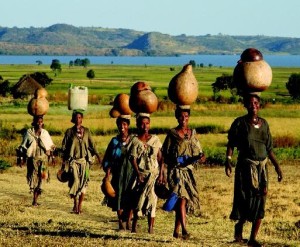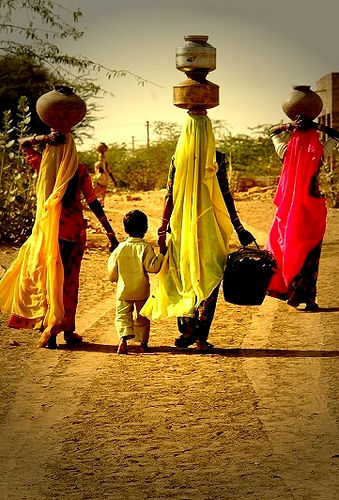Rachel Schneller's (Mali 1996-98) "Water"
This lovely piece is by a very fine writer, Rachel Schneller (Mali 1996-98). She recreates a scene many of us have marveled at during our Peace Corps years.
Water
When a woman carries water on her head, you see her neck bend outward behind her like a crossbow. Ten liters of water weights twenty-two pounds, a fifth of a woman’s body weight, and I’ve seen women carry at least twenty liters in aluminum pots large enough to hold a television set.

To get the water from the cement floor surrounding the outdoor hand pump to the top of your head, you need help from the other women. You and another woman grab the pot’s edges and lift it straight up between you. When you get it to the head height, you duck underneath the pot and place it on the wad of rolled-up cloth you always wear there when fetching water. This is the cushion between your skull and the metal pot full of water. Then your friend lets go. You spend a few seconds finding your balance. Then with one hand steadying the load, turn around and start you way home. It might be a twenty-minute walk through mud huts and donkey manure. All of this is done without words.

It is an action repeated so many times during the day that even though I have never carried water on my head, I know exactly how it is done.
Do not worry that no one will be at the pump to help you. The pump is the only source of clean drinking water for the village of three thousand people. You family, your husband and children rely on the water on your head; maybe ten people will drink the water you carry. Pump water, everyone knows, is clean.
Drinking well water will make you sick. Every month, people here die from diarrhea and dehydration. The pump is also where you hear gossip from the women who live on the other side of the village. Your trip to the pump may be your only excuse for going outside of your family’s Muslim home alone.
When a woman finds her balance under forty pounds of water, I see her eyes roll to the corners in concentration. Her head makes the small movements of the hands of someone driving a car: constant correction. The biggest challenge is to turn all the way around from the pump to go home again. It is a small portion of the ocean, and it swirls and lurches on her head with long movements.

It looks painful and complicated and horrible for the posture and unhealthy for the vertebrae, but I wish I could do it. I have lived in this West African village for two years, but cannot even balance something solid, like a mango, on my head, let alone a pot filled with liquid. When I lug my ten liter plastic jug of water to my house by hand, it is only a hundred meters, but the container is heavy and unwieldy. Changing the jug from one hand to the other helps, but it is a change necessary every twenty meters. Handles do not balance. On your head, the water is symmetrical like the star on top of a Christmas tree. Because my life has never depended on it, I have never learned to balance.

•
After her Peace Corps tour, Rachel earned her MA from the Johns Hopkins School of Advanced International Studies (SAIS). She then became a foreign service officer with the U.S. Department of State. She began her service in 2001 and has served at U.S. embassies in Macedonia and Guinea, as well as in the State Department’s Bureau of Economic and Business Affairs and the Bureau of Intelligence and Research. From 2005-2006, she served at the U.S. regional Embassy Office in Basra, Iraq, where she reported on sectarian violence and internal displacement following the Samarra mosque bombing. She was also a former international affairs fellow in residence at the Council on Foreign Relations and as an International Affairs Fellows she researched the implications for Iraq and U.S. foreign policy of the displacement of 4 million Iraqis from their original homes to locations outside and inside Iraq.
Department’s Bureau of Economic and Business Affairs and the Bureau of Intelligence and Research. From 2005-2006, she served at the U.S. regional Embassy Office in Basra, Iraq, where she reported on sectarian violence and internal displacement following the Samarra mosque bombing. She was also a former international affairs fellow in residence at the Council on Foreign Relations and as an International Affairs Fellows she researched the implications for Iraq and U.S. foreign policy of the displacement of 4 million Iraqis from their original homes to locations outside and inside Iraq.
In Ethiopia everything except children seemed to get balanced on Somali and Oromo women’s heads, including a single open bottle of coke
Thank you for reposting this beautiful essay and thank you to Rachel Schneller for writing it. Ever since the first time I read it, I have thought that if there were ever a piece that brought home the importance of women and water in the Third World through the eyes of a Volunteer from the First World, it was this one.